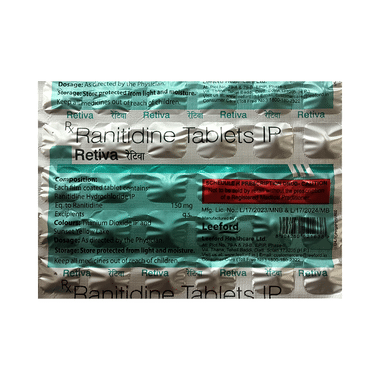Natidine 150mg Tablet
 Prescription Required
Prescription Required

Product introduction
Natidine 150mg Tablet helps promote the healing of stomach and intestinal ulcers and prevents them from recurring. It is also commonly prescribed to prevent heartburn and ulcers caused by the use of painkillers. Take it exactly as prescribed by your doctor. The dose and duration depend on your condition and response to treatment, so follow your doctor’s instructions carefully.
This medicine usually provides relief from indigestion and heartburn within a few hours, and it may only be needed for short-term use when symptoms occur. However, if you are taking it to prevent ulcers or manage ongoing acid-related conditions, your doctor may advise longer use. Taking it regularly can help prevent symptoms from returning. You can also support your treatment by eating smaller, more frequent meals and avoiding spicy or fatty foods.
Most people do not experience side effects while taking this medicine. However, common ones may include headache, constipation, diarrhea, or mild drowsiness. These effects are usually temporary and improve as your body adjusts to the medicine. Consult your doctor if they persist or cause discomfort.
Before starting Natidine 150mg Tablet, inform your doctor if you have liver or kidney problems, as your dose may need adjustment. Also, tell your doctor about any other medicines you are taking, since some may interact with this one. Natidine 150mg Tablet is generally considered safe during pregnancy and breastfeeding when prescribed by a doctor. Avoid alcohol, as it can increase stomach acid and worsen your symptoms.
Uses of Natidine Tablet
- Treatment of Gastroesophageal reflux disease (Acid reflux)
- Management of Peptic ulcer disease
Benefits of Natidine Tablet
In Treatment of Gastroesophageal reflux disease (Acid reflux)
In Management of Peptic ulcer disease
Side effects of Natidine Tablet
Common side effects of Natidine
- Headache
- Gastrointestinal disturbance
- Diarrhea
How to use Natidine Tablet
How Natidine Tablet works
Safety advice
What if you forget to take Natidine Tablet?
All substitutes
Quick tips
- If you are also taking other medications to treat acidity (e.g., antacid), take them 2 hours before or after taking Natidine 150mg Tablet.
- Avoid taking soft drinks, citrus fruits like orange and lemon, which can irritate the stomach and increase acid secretion.
- Inform your doctor if you do not feel better after taking Natidine 150mg Tablet for 2 weeks as you may be suffering from some other problems.
- Inform your doctor if you have ever been diagnosed with kidney disease, as the dose of your medicine may need to be adjusted.
- Do not stop taking the medication without talking to your doctor.
Fact Box
Interaction with drugs
Patient concerns
FAQs
Is Natidine 150mg Tablet safe for long-term use?
Can I take Natidine 150mg Tablet empty stomach?
Is Natidine 150mg Tablet effective?
What are the dos and don’ts while taking Natidine 150mg Tablet?
Can I take alcohol with Natidine 150mg Tablet?
How long does it take for Natidine 150mg Tablet to start working?
What is the difference between Natidine 150mg Tablet and omeprazole?
Can I take Natidine 150mg Tablet empty stomach?
How long does it take for Natidine 150mg Tablet to start working?
What is the difference between Natidine 150mg Tablet and omeprazole?
Can I take alcohol with Natidine 150mg Tablet?
What are the serious side effects of Natidine 150mg Tablet?
What are the dos and don’ts while taking Natidine 150mg Tablet?
Is Natidine 150mg Tablet safe for long-term use?
Is Natidine 150mg Tablet effective?
Disclaimer:
Tata 1mg's sole intention is to ensure that its consumers get information that is expert-reviewed, accurate and trustworthy. However, the information contained herein should NOT be used as a substitute for the advice of a qualified physician. The information provided here is for informational purposes only. This may not cover everything about particular health conditions, lab tests, medicines, all possible side effects, drug interactions, warnings, alerts, etc. Please consult your doctor and discuss all your queries related to any disease or medicine. We intend to support, not replace, the doctor-patient relationship.References
Marketer details
Lab tests offered by us








